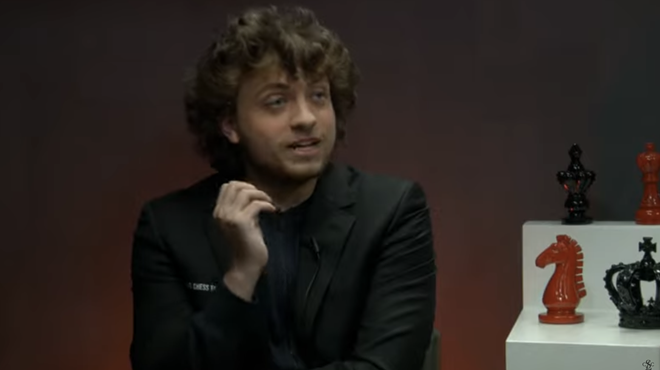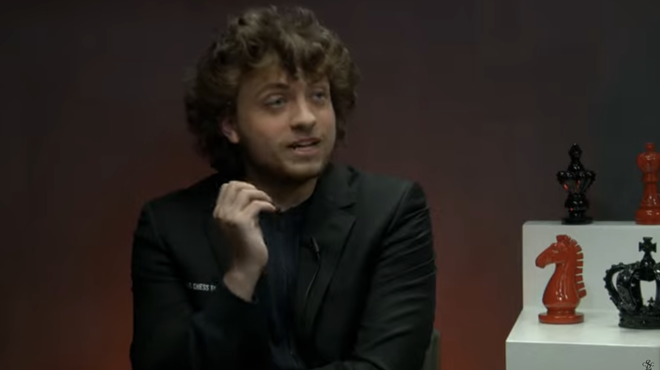Niemann says he was defamed by grand master Magnus Carlsen, who'd alleged Niemann cheated Carlsen in order to win the prestigious Sinquefield Cup — and then was blocked from play by Chess.com, which had recently merged with Carlsen's eponymous online chess company, Play Magnus.
U.S. District Court Judge Audrey Fleissig dismissed key claims in the suit yesterday with prejudice, meaning they cannot be refiled. But Niemann's attorneys told the Wall Street Journal they would pursue the defamation claim in state court — and that means it could well be landing soon in the lap of a St. Louis Circuit Court judge.
Allegations that Niemann had cheated garnered attention even outside the chess world — in part due to the salaciousness of the suggestion that Niemann had used anal beads to do it. No less than Elon Musk weighed in (in a since-deleted tweet, the Twitter CEO wrote, "Talent hits a target no one else can hit, genius hits a target no one can see (cause it’s in ur butt)"), and even It's Always Sunny in Philadelphia memorably used the allegation as a jumping-off point for a vibrating cheating device.
Judge Fleissig, for her part, did not weigh in on the merits of the anal bead theory. She wrote that her jurisdiction was limited to antitrust claims.
Summarizing the case, Fleissig wrote, "Niemann alleges that his surprise victory over Carlsen at the Sinquefield Cup in St. Louis on September 4, 2022, 'effectively dashed Carlsen’s two remaining statistical ambitions, namely: achieving a 2900 FIDE performance rating for the first time in history; and breaking his own world-record unbeaten streak in FIDE-sanctioned events,' both of which 'would have solidified Carlsen as arguably the greatest chess player of all time and made his burgeoning chess empire even more valuable.'
"Niemann alleges that, as a result of this upset, Carlsen retaliated by falsely accusing Niemann of cheating during their in-person match at the Sinquefield Cup and demanding that the tournament organizers immediately disqualify Niemann, even though Carlsen had no legitimate basis to suspect Niemann of cheating. When the organizers refused to disqualify Niemann, Carlsen withdrew from the tournament." And after that, Chess.com swiftly banned Niemann from its platform.
Unfortunately for Niemann, Fleissig found that he did not have a plausible antitrust claim under federal law, noting that the law is meant to protect "competition, not competitors." Because Niemann doesn't operate a professional chess tournament or an online chess platform, she wrote, he can't show the specific types of injury necessary to sustain an antitrust claim.
"Niemann’s ban resulted from his alleged violation of Chess.com’s rules regarding cheating," Fleissig wrote. "As noted above in the discussion of antitrust injury, Niemann has not plausibly alleged that Chess.com’s enforcement of its rules — whether fair or not as applied to Niemann — adversely affected competition among the professional chess tournaments and online recreational chess platforms that comprise the Competitive Chess Market."
And so ends the 19-year-old chess prodigy's federal claim. Stay tuned to see if the anal bead theory gets more of a hearing in state court, which would likely be much more focused on defamation than claims of anti-competitive conspiracies.
In the meantime, all thanks to chess enthusiast/local billionaire Rex Sinquefield for giving us the Sinquefield Cup and all of this popcorn-worthy drama. It's not just keeping the lawyers busy; it's keeping the rest of us mighty entertained.
Subscribe to Riverfront Times newsletters.
Follow us: Apple News | Google News | NewsBreak | Reddit | Instagram | Facebook | Twitter | Or sign up for our RSS Feed








